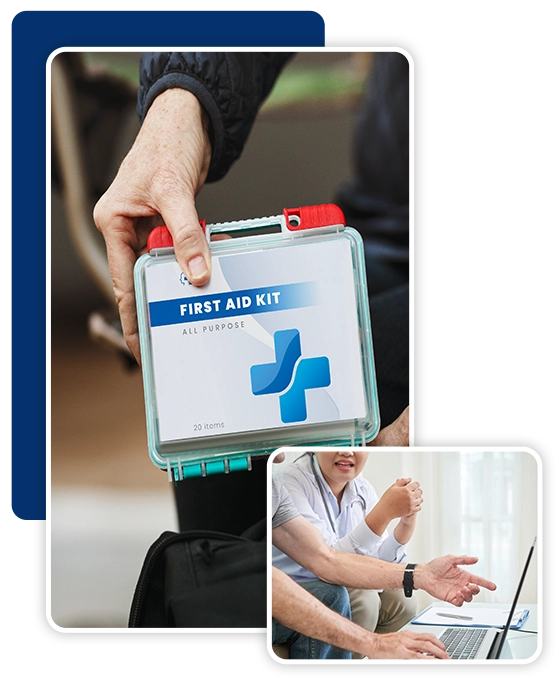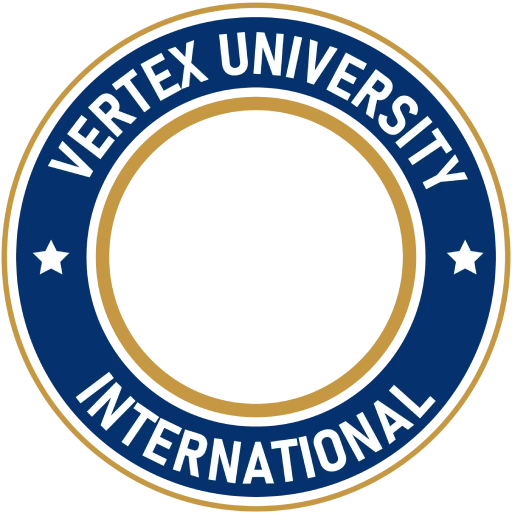Master Emergency and Health Disaster Management MEDMH
With the increasing health challenges and the increasing frequency of disasters worldwide, there is a need for qualified staff in managing health emergencies to ensure effective and rapid response in crises. In this context, the Faculty of Health and Environmental Sciences at Vertex University offers the Master's Program in Emergency and Health Disaster Management, which aims to prepare specialists with knowledge and practical skills in analyzing health emergencies, designing rapid intervention strategies, and raising the efficiency of institutional preparedness to face future crises.
The program focuses on building a scientific and professional base in the management of emergencies and health risks. Students learn how to study different crisis scenarios, plan interventions, and coordinate work between the relevant health authorities. It is also interested in developing leadership and organizational skills through training in managing emergency teams, planning for evacuation, and implementing prevention strategies, while reviewing the best international experiences in health disaster management. The goal of the program is to qualify professionals who are able to make vital decisions at critical times, while adopting an approach of innovation and continuous modernization in field work.
The program relies heavily on practical training, providing students with opportunities to apply their knowledge in realistic environments through simulation exercises, field participation, and analysis of actual case studies. It also includes training on health policies, resource management during disasters, and legislative frameworks related to the management of health crises, which enhances the readiness of graduates to work efficiently in various emergency situations.
The implementation of the program is supervised by a team of academics and practitioners with experience in the field of health emergencies and disasters. They provide content that combines modern theory and real practice. The university also provides an advanced learning environment that includes simulation techniques, practical training, and specialized research projects to support the development of emergency health systems and improve disaster response mechanisms. The program provides additional professional certificates, which enhance the employability of graduates locally and internationally in multiple fields.
The program opens up broad professional prospects, as graduates can work in emergency management centers, rapid response units, disaster planning departments of health institutions, and humanitarian relief organizations. They can also join public health bodies, international institutions, hospitals, and health consulting companies. They are also allowed to establish their own initiatives in the field of disaster management, giving them excellent professional opportunities in a field that is one of the most sought after specialties today.
Our Vision and Mission
The Master's Program in Emergency and Health Disaster Management at Vertex University prepares you with the skills of risk analysis, rapid response planning, and effective management of health crises in accordance with the highest international standards in order to lead rescue and health sustainability efforts in meeting global challenges.
Our Vision
Preparing specialized staff capable of effectively managing health disasters and enhancing the resilience and sustainability of health systems by developing preventive strategies and emergency responses with international standards.
Our Mission
Providing an integrated education that combines scientific analysis and practical application to enable students to prepare emergency plans, manage health risks, and ensure continuity of health services using the latest tools and techniques.
- Qualifying students with advanced skills in emergency planning and rapid response to health disasters in order to ensure the protection of public health and enhance the sustainability of health services.
- Enable them to use modern analytical tools to understand epidemiological situations, evaluate health disasters, and make evidence-based decisions to effectively address them.
- Training students to design and implement emergency plans in cooperation with local and international health authorities to ensure a comprehensive and integrated response.
- Provide students with knowledge about the use of advanced technology, such as artificial intelligence, big data analysis, and health information systems in predicting and managing crises efficiently.
- Develop teamwork and communication capabilities with medical teams, relief organizations, government bodies, and the private sector to ensure an integrated and effective response to health crises.
- Enable them to make decisive and quick decisions under emergency circumstances, with a focus on managing health resources and medical equipment to ensure optimal use during disasters.
- Guide students to develop proactive strategies aimed at reducing the effects of health disasters on individuals and communities, and enhancing the ability of health systems to deal with epidemics and disasters.
- Enable them to assume leadership positions in hospitals, humanitarian organizations, government bodies, health risk management companies, and research centers.
- Introducing students to health standards and legislation at the local and international levels to ensure compliance with legal regulations in emergency management.
- Establishing the principles of ethical and professional responsibility in dealing with emergency cases, and ensuring transparency and integrity in the management of health crises.
- Encouraging students to find innovative solutions to meet increasing health challenges through scientific research, strategic analysis, and the development of effective health policies.
- Supporting them in developing scientific studies and research that contribute to improving health disaster management strategies and providing effective recommendations to decision makers.
Teaching methods and strategy

case studies
Vertex University adopts an advanced educational approach that integrates real and virtual case studies within the Master of Emergency and Health Disaster Management courses. Students deal with real scenarios of health crises and disasters, giving them the ability to analyze health risks and develop effective response strategies. The program focuses on managing epidemics, coordinating health emergency efforts, and studying the impact of health disasters on communities in accordance with the best international standards. Students are also trained to assess health risks in different environments, enabling them to provide innovative solutions that enhance the sustainability of health systems and reduce the impact of disasters on public health.

Scientific projects
The program enhances the practical aspect through research and applied projects that provide students with the opportunity to develop emergency and health disaster management plans, study the impact of epidemics, and design preventive strategies to reduce health risks. These projects include analyzing public health data, using artificial intelligence techniques to predict epidemics, and developing strategies to improve the speed and efficiency of response to health disasters. The focus is also on evaluating the preparedness of health facilities, developing logistics solutions for managing medical resources during disasters, and designing integrated response plans to ensure the sustainability of health services during emergencies.

Teaching strategies
The Master of Emergency and Health Disaster Management program at Vertex University is based on an advanced educational approach that combines theoretical foundations and practical applications using the latest interactive digital environments. The program provides students with an in-depth understanding of emergency and health disaster management methods and the latest tools and techniques used in the field. The content is delivered through interactive live lectures, simulation sessions of health emergency response strategies, and case studies that simulate realistic health disasters such as epidemics and natural disasters. The program also focuses on developing analytical and planning skills through group discussions, virtual field research projects, and interactive workshops, which enhance students' ability to assess health risks, prepare emergency plans, and coordinate between health authorities very efficiently.
What can you do with a Master's degree in Emergency and Health Disaster Management?
The Master of Emergency and Health Disaster Management from Vertex University qualifies its graduates to work in emergency management, crisis response planning, and health risk assessment in order to enhance the sustainability of health systems, protect communities, and ensure continuity of services during disasters. Thanks to their advanced skills, graduates become a key element in developing health care and addressing global health challenges. The most prominent of these jobs are the following:
Be the driving force behind medical relief initiatives during natural disasters and epidemics.
- Director of Health Emergencies
- Specialist in health risk management
- Disaster Response Coordinator
- Director of Public Health in Emergency Situations
- Health Disaster Data Analyst
- Strategic plan for health emergencies
- Health Services Continuity Manager
- Medical Relief Coordinator
Contributed to building advanced information systems to monitor and analyze future health crises.
- Expert in emergency health policies
- Emergency Health Information Systems Specialist
- Director of Hospital Emergency Services
- Advisor on Health Disasters
- Field trainer in health crisis management
- Researcher in disasters and health crises
- Communication specialist during health disasters
Get a consultation
Free now
Do you want to help?
+1 (984) 382-6080
Target group for the Master of Emergency and Health Disaster Management Program

The Master of Emergency and Health Disaster Management program targets a diverse group of individuals who want to enhance their skills and knowledge in the field of effective health disaster response and emergency planning. Target groups include the following:
- Those with a bachelor's degree in public health, nursing, medicine, hospital administration, or related specialties, who are seeking to build a strong career in health emergency management, risk assessment, and developing effective response strategies to health crises.
- Health practitioners and administrators working in hospitals, health organizations, relief agencies, and disaster management who aspire to develop their skills in emergency planning, resource management during crises, and health risk analysis to enhance the efficiency of responding to epidemics and health disasters.
- Professionals from other fields, such as public administration or health policy, who want to move into the health crisis management sector and acquire the necessary skills in risk analysis, developing emergency plans, and managing health responses to crises and disasters.
- Emerging entrepreneurs in the health and health technology sector who seek to enhance the ability of their systems to deal with crises, develop innovative solutions in managing health disasters, and make use of graphic analysis and modern technology to support health planning and crisis prevention.
Enhance your professional skills with international certifications
Awarded by the American College of Health Administration (ACHE), it is for professionals in hospital and healthcare management.
It qualifies its recipients to provide primary care to injured people at the event site before the arrival of specialized medical teams. It is an essential step to understand the dynamics of field emergencies.
It focuses on the principles of humanitarian disaster management and is concerned with training individuals to coordinate relief efforts, assess needs, and deal with crises in affected environments.
It is concerned with qualifying leaders and planners to coordinate efforts between different bodies during emergencies and developing decision-making skills under pressure.
Provides practical knowledge of early warning mechanisms, reporting epidemics, and coordinating international response in health emergencies.
It focuses on the use of information systems techniques to track the spread of epidemics and identify geographical priorities in the distribution of health resources.
It trains individuals in advanced ambulance techniques in unsafe or resource-limited environments. It is useful for first care providers in disaster sites.
Admission Requirements
- Regular admission: the student applying for the graduate program must have a bachelor's degree from a reputable university or from the student's country.
- The applicant has a bachelor's degree in Health Services Administration, Public Health, Human Medicine, Nursing, or equivalent majors accredited by a recognized university.
- English language proficiency if the language of instruction in the program is English, with passing the approved language test.
- Conditional admission: The university may offer conditional admission to applicants until all admission requirements are met (terms and conditions for this category apply).
- Submit official documents including the original Bachelor's degree and transcript, along with true copies.
- Fill out the electronic application form through the admission and registration portal at the university.
- Pay the registration fees and tuition fees prescribed in accordance with the university regulations.
- Comply with the university's rules and regulations by signing an official pledge.
Required Documents
- A colored copy of the bachelor's degree issued by the student's country “Ministry of Higher Education”.
- A colored copy of the student's or family ID for matching.
- A colored copy of the student's passport.
- Personal photo (6*4) with a white background.
- Complete the registration data and sign it by the student.
Requirements for Obtaining Master in Emergency and Health Disaster Management MEDMH Specialization
| Number of Credit Hours Required to Complete the Master Degree | 33 Minimum Required Credit Hours |
|---|---|
| Number of Required Academic Semesters | 4 Academic Semesters |
| Number of Semesters per Year | 3 Semesters |
| Annual Credit Hours | 45 Credit Hour |
| Semester Duration | 8 to 10 weeks |
| Expected Duration to Complete the Program | 1 year and 18 months |
Advantages of this system.
- Complete the master's degree in a short time: the program can be completed in one and a half years instead of two or three years.
- Flexible distribution of materials: materials are distributed throughout the year, allowing continuous learning without long interruptions.
- An intensive schedule: allows you to finish school quickly and is suitable for students who want to enter the labor market as soon as possible.
*This system was designed at Vertex University to enable students to obtain their university degree in a shorter time while maintaining the quality of education and the efficiency of the academic process.

Want to get more information?
Register your details and we will contact you as soon as possible
Frequently Asked Questions about Master Emergency and Health Disaster Management MEDMH
An integrated blend of theory and practice, with realistic projects, health data analysis, and virtual or field training.
The college seeks to obtain CAHME and APHEA accreditation. The curricula are designed according to academic and professional quality standards.
Prior experience is preferred, especially in healthcare administration, but is not a mandatory requirement.
Yes, students can choose a flexible system that fits their practical obligations.
Yes, classes can be temporarily postponed or suspended according to university policy.
Leadership positions in hospitals, health organizations, the government sector, or academic and research work.
